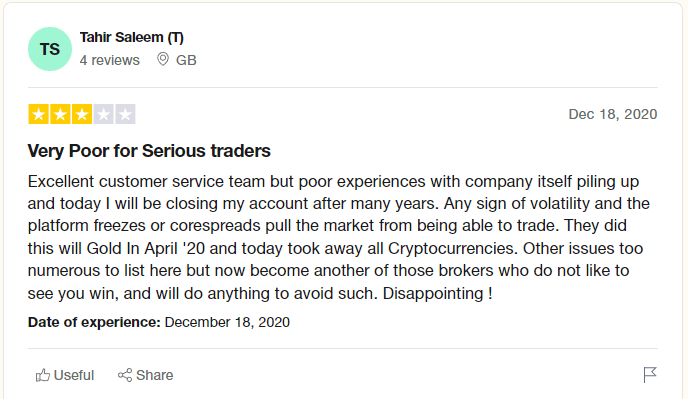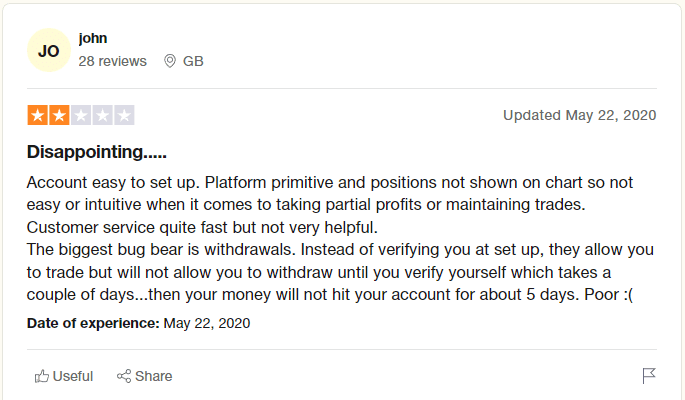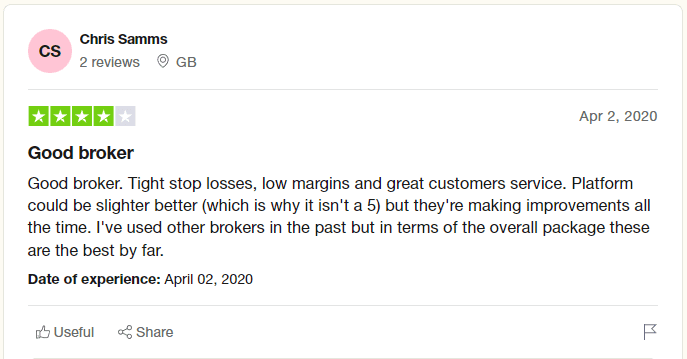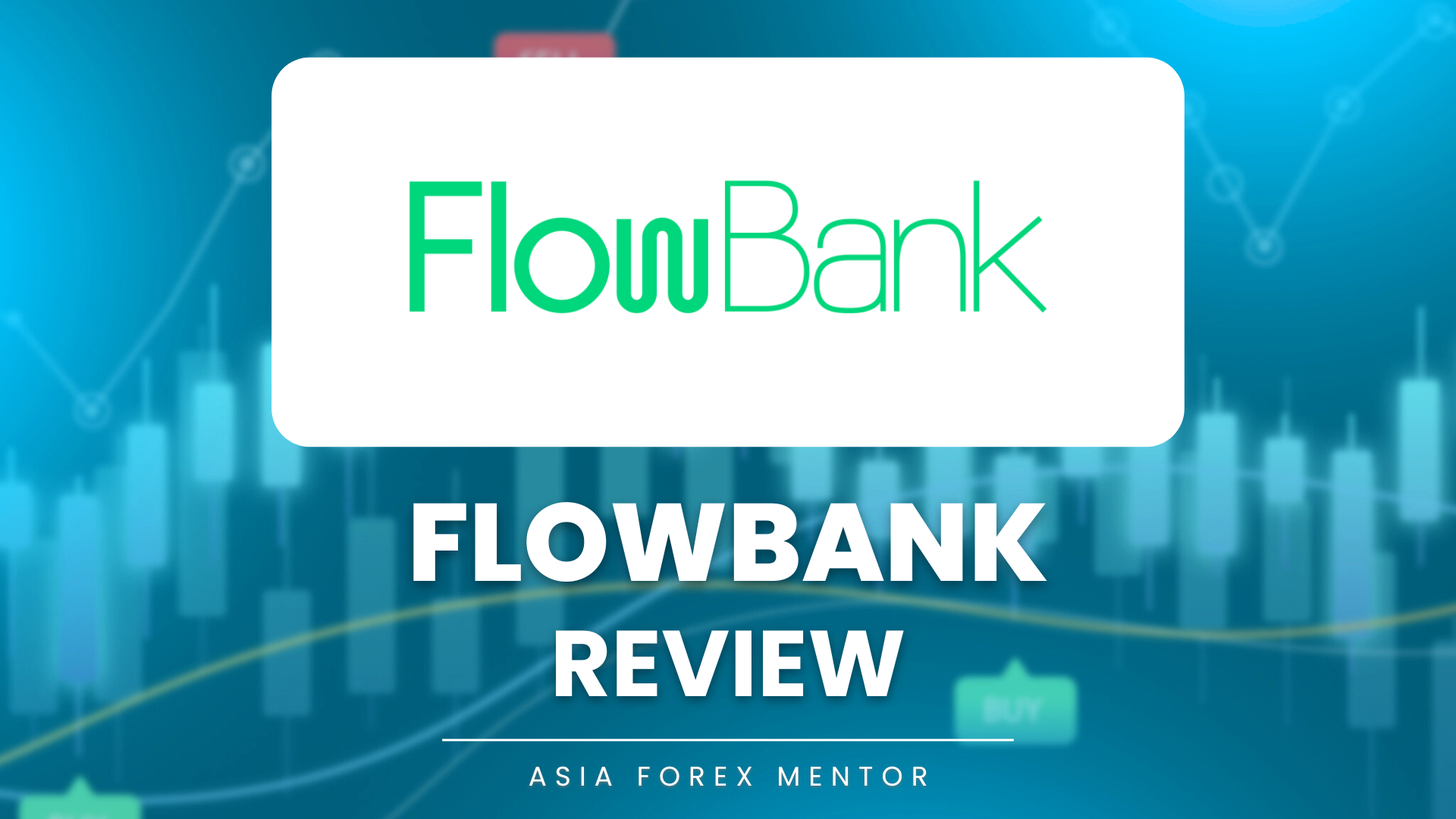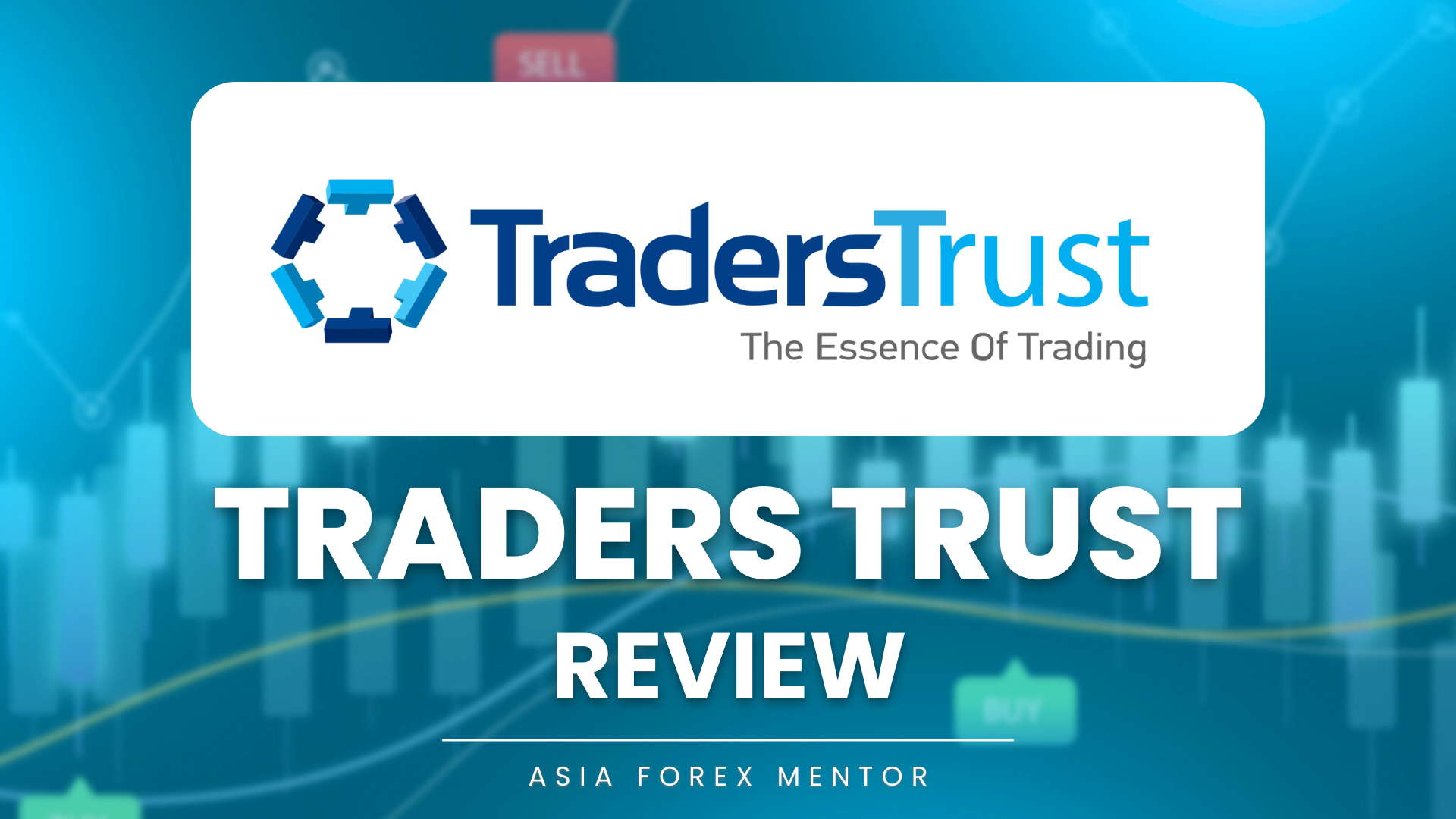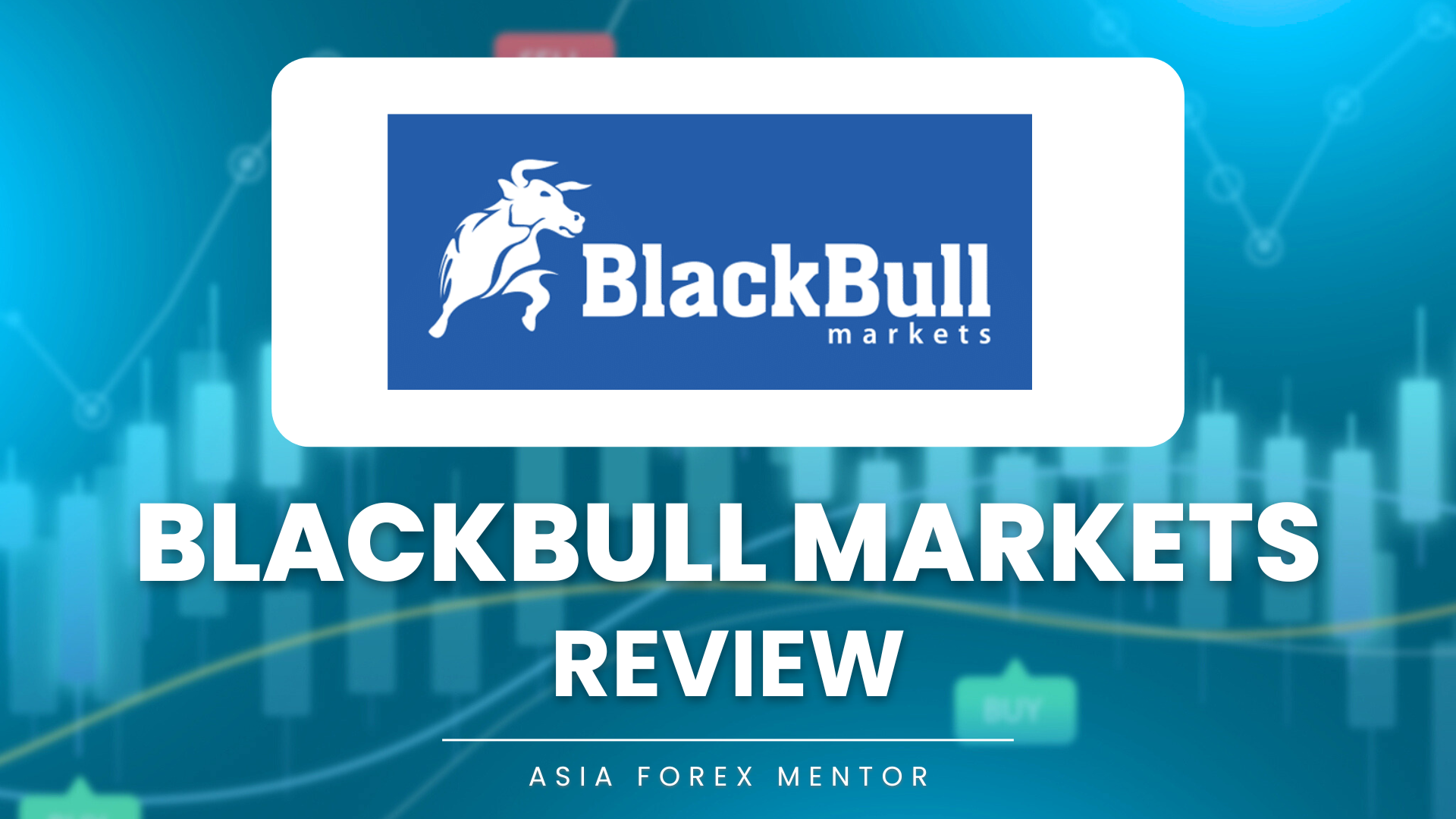Swiss Markets Review
Finding the right broker to suit your trading needs can be a challenging task, with so many brokers available, each offering different trading conditions, platforms, and financial instruments. It can be overwhelming to select the right one. Therefore, in this review, we will use Asia Forex Mentor’s meticulous and unbiased evaluation criteria to discuss all the features of this broker.
This Swiss Markets review will examine the various tools and offerings of Swiss Markets, including its trading conditions, trading platforms, account types, and customer support. We will also discuss the advantages and disadvantages of trading with Swiss Markets. Finally, at the end of the review, we will decide whether this broker could be the right fit for a trader looking for a new broker.
What is Swiss Markets?

Swiss Markets is an online broker that provides trading services in various financial instruments, including Forex, Indices, Commodities, and Cryptocurrencies. The broker is based in Cyprus and is regulated by the Cyprus Securities and Exchange Commission (CySEC).
Swiss Markets was founded in 2016 with the goal of providing a professional and innovative trading experience to traders worldwide. The broker has since established itself as a leading provider of online trading services, offering clients access to a wide range of financial markets and instruments. Swiss Markets has built a strong reputation for its high level of customer service, competitive pricing, and commitment to regulatory compliance. The broker continues to evolve its product offerings and technology to meet the changing needs of traders and investors around the world.
Swiss Markets aims to provide its clients with a secure and transparent trading environment, as well as access to a range of trading tools and educational resources. The broker offers different account types and trading platforms, competitive pricing, and reliable customer support. Swiss Markets also emphasizes regulatory compliance, operating in accordance with the highest industry standards to protect its clients’ interests.
Advantages and Disadvantages of Trading with Swiss Markets
Benefits of Trading with Swiss Markets
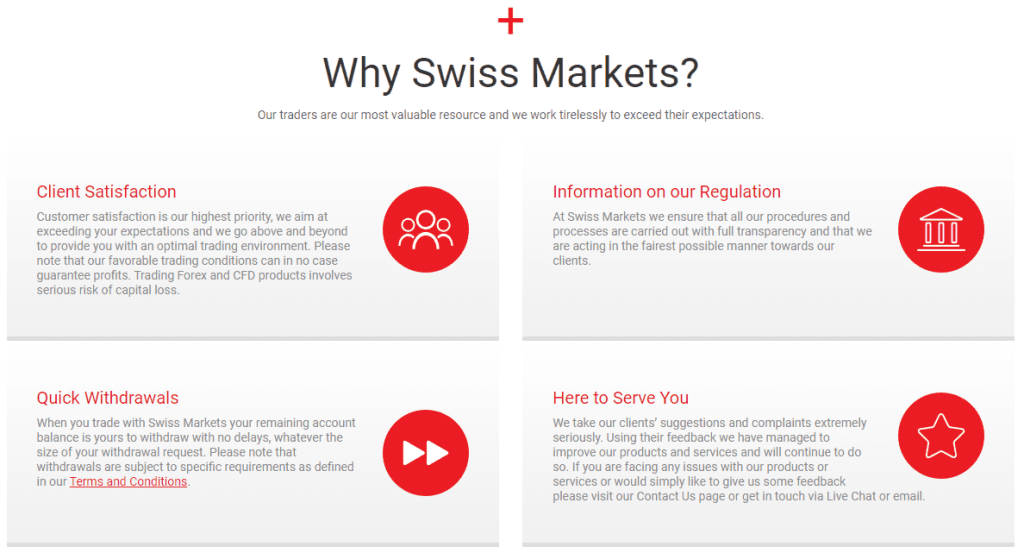
Swiss Markets is a regulated and licensed broker that provides traders with a secure and transparent trading environment. The broker offers a variety of trading tools and educational resources to help clients achieve their financial goals, including different account types and trading platforms to suit their needs. Swiss Markets’ trading conditions include competitive spreads and leverage ratios, allowing traders to maximize their returns.
Swiss Markets offers a variety of trading platforms, including the popular MetaTrader 4 (MT4) platform and its own proprietary platform, Swiss Markets Trader. The MT4 platform is a widely used trading platform that offers advanced charting tools, technical analysis, and automated trading capabilities. Swiss Markets Trader, on the other hand, is a web-based platform that is user-friendly and easy to navigate, making it an ideal choice for novice traders.
One of the key features of Swiss Markets Trader is its risk management tools, including stop loss and take profit orders, which can help traders limit their losses and lock in profits. The platform also offers negative balance protection, which means that traders cannot lose more than the amount they have deposited in their trading account.
Another benefit of Swiss Markets Trader is its fast execution speeds, which help traders take advantage of market opportunities in real-time. The platform is also available in multiple languages, including English, German, Spanish, French, Italian, and Arabic, which makes it accessible to traders from different regions of the world.
Finally, one last benefit of the broker is the availability of many different types of financial instruments. Swiss Markets offers a wide range of financial instruments, including Forex, Stocks, Indices, Commodities, and Cryptocurrencies.
In summary, Swiss Markets provides traders with a variety of trading platforms, competitive trading conditions, and a wide range of financial instruments to trade, including Forex, Indices, Commodities, and Cryptocurrencies. Traders can take advantage of the broker’s user-friendly platforms, reliable customer support, and regulatory compliance to help achieve their financial objectives.
Swiss Markets Pros and Cons
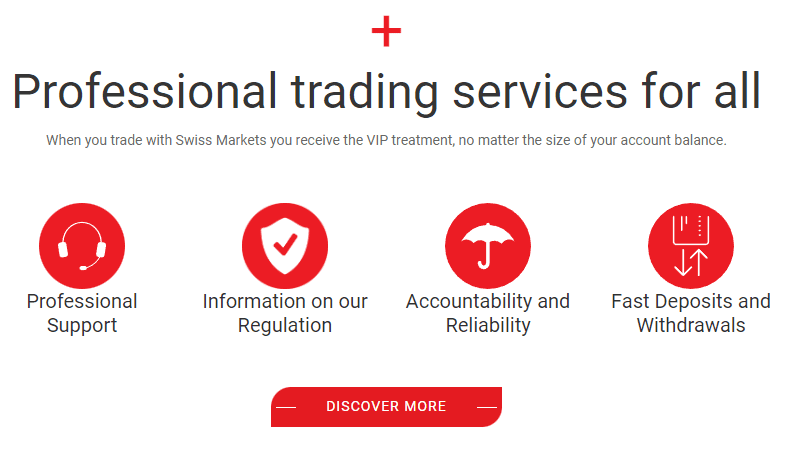
Pros:
- Wide variety of withdrawal and deposit options
- Affiliate program
- Educational resources
Cons:
- No sign up or first deposit bonuses
- Relatively high commissions
- Inactivity fees
Swiss Markets Customer Reviews
Swiss Markets has received a “Mediocre” rating on Trustpilot, with a 1.8 out of 5-star rating based on 25 reviews. While this number of reviews is relatively low, it may be justified by the short history of the broker.
The majority of the reviews discuss customers’ interactions with Swiss Markets’ support team, with some stating that the team does not provide the best treatment to the clients and commenting on difficulties encountered in the process of contacting the support, particularly during weekends. Some reviews even go as far as to label this broker as a “scam” due to problems encountered in filling orders.
Swiss Markets Spreads, Fees, and Commissions
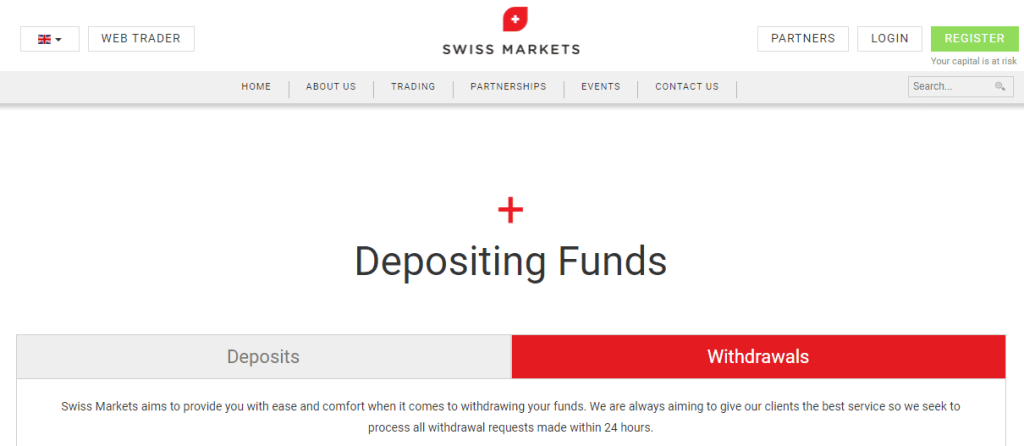
Swiss Markets offers different fees, spreads, and commissions based on the account type chosen by the trader. The Classic STP Account has spreads that start from 1.2 pips and does not charge commissions. Instead, the broker charges a markup on the spreads to cover its services.
The Raw STP – Swiss11 and Swiss8 Accounts have spreads that start from 0.0 pips and charge commissions of $11 and $8 per lot per side, respectively. Unlike the Classic STP Account, there is no markup on the spreads for these accounts.
The Raw STP – Swiss5 Account is designed for high-volume traders and has spreads that start from 0.0 pips with a commission of $5 per lot per side.
Additionally, there may be other fees associated with trading on Swiss Markets, such as swap fees for holding positions overnight, which vary depending on the financial instrument being traded, the position size, and the direction of the trade.
Finally, Swiss Markets charges an inactivity fee of $10 per month for accounts that have not been active for a period of three months or more. This fee is charged to cover the cost of maintaining the account and providing access to the trading platform, even if the trader is not actively using it.
Account Types
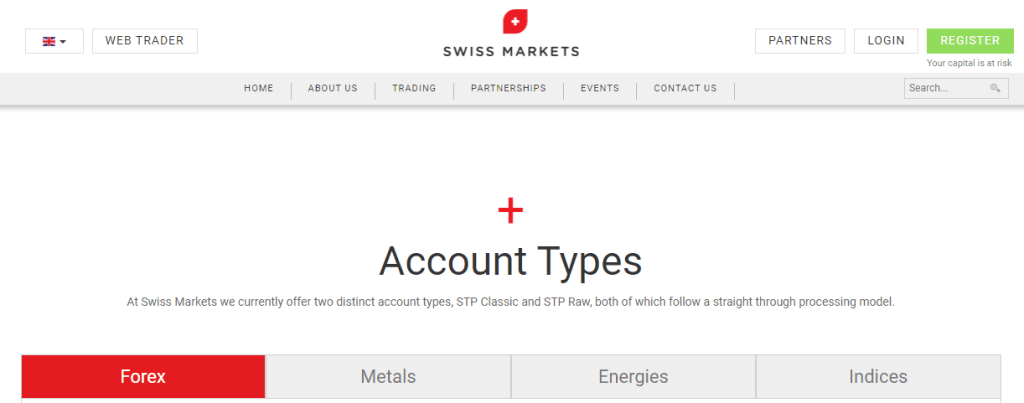
Swiss Markets offers four different account types, ranging from the ones more suited to beginners and traders with a lower budget, to the premium Raw STP – Swiss5 account which targets full time expert traders with a high budget.
- Classic STP Account: This is Swiss Markets’ basic account type, and it is designed for novice traders who want to start trading with a lower initial deposit. This account type offers variable spreads starting from 1.2 pips and requires a minimum deposit of $200. It also offers access to the Swiss Markets Trader platform and 24/5 customer support.
- Raw STP – Swiss11: This account type is designed for experienced traders who require tighter spreads and faster execution speeds. The Raw STP – Swiss11 account offers raw spreads starting from 0.1 pips, with a commission of $11 per standard lot traded. It requires a minimum deposit of $2,000 and offers access to the Swiss Markets Trader platform, as well as additional trading tools and resources.
- Raw STP – Swiss8: This account type offers raw spreads starting from 0.0 pips, with a commission of $8 per standard lot traded. It requires a minimum deposit of $25,000 and offers access to the Swiss Markets Trader platform, as well as additional trading tools and resources.
- Raw STP – Swiss5: This is Swiss Markets’ premium account type, and it is designed for professional traders who require the tightest spreads and fastest execution speeds. The Raw STP – Swiss5 account offers raw spreads starting from 0.0 pips, with a commission of $5 per standard lot traded. It requires a minimum deposit of $100,000 and offers access to the Swiss Markets Trader platform, as well as additional trading tools and resources, as well as a dedicated account manager and other personalized services.
All Swiss Markets accounts have a minimum tradable lot of 0.01 and a maximum leverage of 1:500, which may vary depending on the financial instrument that is being traded.
It’s worth noting that each account type has different trading conditions and requirements, including minimum deposit amounts, spreads and commissions. Traders should carefully consider their trading needs and experience level when selecting the account type that best suits their needs.
How To Open Your Account?
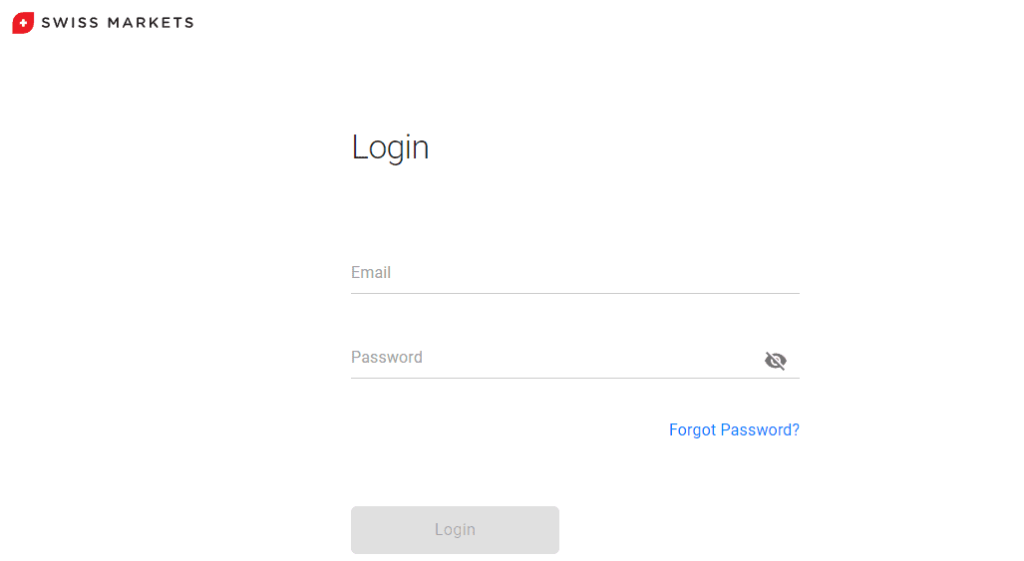
Opening a Swiss Markets account is a simple process that can be completed online in just a few steps. However, the time required to complete these steps may vary depending on your location and the number of people currently trying to open an account. Typically, the process can be completed within a few days. The steps involved in opening an account are as follows:
- Visit the Swiss Markets website and click on the “Open Account” button.
- Fill out the registration form with your personal information, including your name, email address, phone number, and country of residence.
- Choose the account type that best suits your needs, including the Classic STP, any of the other Raw STP accounts.
- Verify your identity by providing a copy of your ID or passport and a proof of address.
- Make a deposit into your trading account using one of the available payment methods, which may include credit/debit cards, bank transfers, or e-wallets.
- Once your account is verified and funded, you can download the trading platform or use the web-based platform to start trading.
It’s worth noting that different account types may have different deposit requirements and trading conditions. Additionally, some account types may offer additional features, such as access to a personal account manager or higher leverage ratios. Before opening an account with Swiss Markets, it’s important to review the account types and associated costs and benefits to ensure you select the right account for your needs.
What Can You Trade on Swiss Markets
Swiss Markets offers a range of financial instruments that can be traded on their platform. These include:
- Forex: Traders can access over 60 major, minor, and exotic currency pairs, including EUR/USD, USD/JPY, and GBP/USD.
- Commodities: Swiss Markets allows traders to trade popular commodities such as gold, silver, crude oil, and natural gas.
- Indices: Traders can access a range of global indices, such as the S&P 500, NASDAQ, FTSE 100, DAX 30, and more.
- Shares: Swiss Markets also provides access to a range of shares from major companies, such as Apple, Amazon, and Microsoft.
- Cryptocurrencies: Traders can access a selection of cryptocurrencies, including Bitcoin, Ethereum, Litecoin, and Ripple.
Overall, Swiss Markets offers a diverse range of financial instruments to meet the needs of different types of traders, but it is important to remember that the broker does not allow ETF and Option trading.
Swiss Markets Customer Support
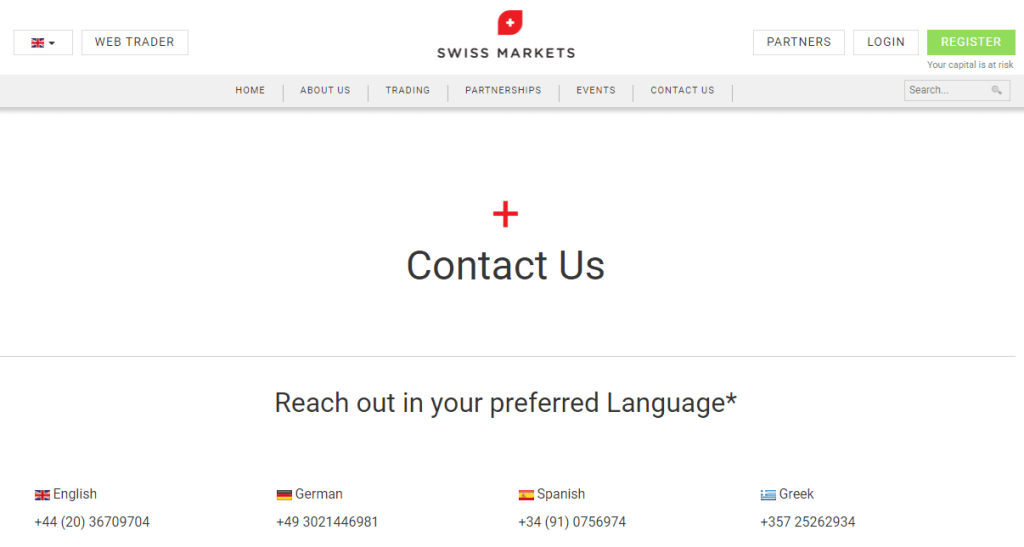
Swiss Markets offers a range of customer support options to its clients. The support team is available 24/5 and can be reached via phone, email, or live chat on the website. The website also includes an FAQ section that covers the most common queries related to account opening, funding, trading conditions, and more.
In addition to the standard support options, Swiss Markets provides its clients with access to a personal account manager who can assist them with any questions or issues they may have. The broker also offers educational resources such as webinars and seminars to help traders improve their skills and knowledge.
It is important to note that Swiss Markets’ customer support is provided in many different languages, including English, German, Italian, and Spanish.
Overall, Swiss Markets’ customer support is comprehensive, responsive and multilingual, offering traders the assistance they need to navigate the platform and trading process.
Advantages and Disadvantages of Swiss Markets Customer Support
Security for Investors
Withdrawal Options and Fees
Swiss Markets provides several withdrawal options for its clients, including Visa/MasterCard, bank wire transfer, Skrill, Neteller, Sofort, and Giropay. For Visa/MasterCard withdrawals, there is no fee charged by Swiss Markets, but the processing time may take up to 10 business days.
For bank wire transfers, there is also no fee charged by Swiss Markets, but the processing time may take up to 5 business days. It’s important to note that additional fees may be charged by the receiving bank. For e-wallets like Skrill, Neteller, Sofort and Giropay, there are no fees charged by Swiss Markets, and the processing time is usually within 24 hours.
It’s important to note that Swiss Markets may require additional documentation and verification before processing withdrawals, and clients should ensure they have met all requirements before initiating a withdrawal. Additionally, some payment providers may charge their own fees for transactions, which are not the responsibility of Swiss Markets.
Finally, Swiss Markets does not charge any deposit fees for any of its account types. However, it is always advisable to check with your payment provider or bank to ensure that they do not charge any fees for deposits made to Swiss Markets.
Swiss Markets Vs Other Brokers
#1. Swiss Markets vs Avatrade
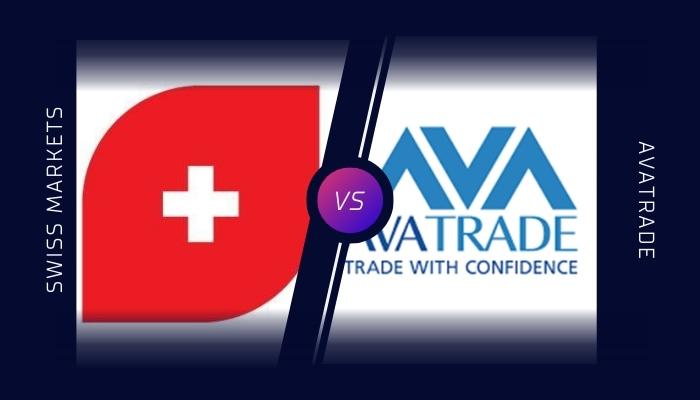
In terms of trading platforms, Swiss Markets offers MetaTrader 4 and their proprietary Swiss Markets Trader web platform, which is equipped with advanced trading tools and strong charting capabilities. On the other hand, AvaTrade provides a wider selection of platforms, including MetaTrader 4, MetaTrader 5, and their proprietary AvaTradeGo and AvaOptions platforms.
While AvaTrade is well-known for its competitive pricing, Swiss Markets charges relatively high fees for all account types except for the Standard account, which is advertised as “trading commission-free”. Furthermore, Swiss Markets has a higher minimum deposit requirement of $200 compared to AvaTrade’s $100 requirement.
Finally, both brokers offer a similar variety of tradable financial instruments, including nearly the same number of tradable currency pairs. However, it is important to note that AvaTrade does not offer cryptocurrency trading.
In conclusion, after conducting a thorough analysis, our team of experts believes that AvaTrade is a slightly better alternative than Swiss Markets, primarily due to the lower fees and commissions they offer.
#2. Swiss Markets vs Roboforex
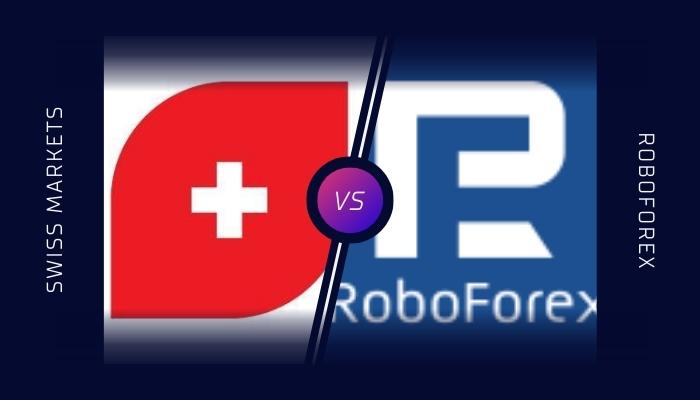
Both Swiss Markets and RoboForex offer a wide range of financial instruments. However, Swiss Markets has a broader selection of forex pairs, while RoboForex offers more cryptocurrencies and the ability to trade ETFs, which are not available on Swiss Markets.
In terms of trading platforms, Swiss Markets provides the popular MetaTrader 4 platform, as well as their proprietary web trading platform. In contrast, RoboForex offers MetaTrader 4 and MetaTrader 5, along with their own R Trader platform and others, providing more options for their clients.
While both brokers offer floating spreads that start at 0.0 pips, Swiss Markets has a lower maximum leverage of 1:500, while RoboForex offers a higher maximum leverage of up to 1:2,000.
Overall, RoboForex and Swiss Markets are similar. However, RoboForex provides more trading opportunities due to the higher maximum leverage, a wider range of platforms, and a greater selection of financial instruments. As a result, we conclude that RoboForex is a better option than Swiss Markets.
#3. Swiss Markets vs Alpari

Starting from the tradable financial instruments, it is important to note that Alpari’s clients are able to trade ETFs, which are not available on Swiss Markets, but the latter offers more currency pairs.
Even though Swiss Markets offers a commission free account, Alpari charges lower commissions and has lower minimum deposit requirements. Additionally, Swiss Markets offers a lower maximum leverage compared to Alpari.
After our experts’ analysis, we must conclude that Alpari is a better option due to its lower fees, commissions, and spreads.
Conclusion: Swiss Markets Review
In conclusion, Swiss Markets is a well-regulated forex broker that offers a wide variety of trading instruments, including forex, commodities, indices, and cryptocurrencies. The broker provides a proprietary trading platform, Swiss Markets Trader, which is user-friendly and equipped with advanced trading tools, such as technical analysis indicators, customizable charts, and automated trading. In addition, Swiss Markets offers a range of account types to suit different traders’ needs and preferences.
Swiss Markets’ customer support team is also a notable advantage. The team is available in several languages, including English, German, French, Italian, and Spanish, and is responsive and helpful in addressing traders’ inquiries and concerns. Moreover, Swiss Markets provides educational resources, such as webinars, e-books, and video tutorials, to help traders improve their trading skills and knowledge.
However, Swiss Markets is not without its disadvantages. The broker charges relatively high commissions and swap fees, which may deter traders who are looking for a more cost-effective trading experience. Additionally, Swiss Markets’ maximum leverage of 1:500 is relatively low compared to other forex brokers, which may limit the trading opportunities for some traders. Finally, the inactivity fee, while not exorbitant, may still be a concern for some traders who do not trade frequently.
Overall, our experts’ comprehensive evaluation shows that Swiss Markets is a reputable forex broker that provides a comprehensive trading experience for traders of all levels. While there are some drawbacks, the broker still deserves a worthy consideration for those looking to enter the forex market or switch to a new broker, but traders must be aware of the red flags raised by the reviews on Trustpilot.com.
Swiss Markets Review FAQs
Is Swiss Markets regulated?
Yes, Swiss Markets is a regulated broker. It is registered with and regulated by the Seychelles Financial Services Authority (FSA) under license number SD018. While the Seychelles is not a major financial regulatory center like the US, UK, or EU, the FSA is an established regulatory authority that oversees financial services providers in the country.
Additionally, Swiss Markets is a member of the Financial Commission, an independent self-regulatory organization that provides dispute resolution services to its members and their clients.
What is Swiss Markets minimum deposit?
The minimum deposit required to open an account with Swiss Markets depends on the account type. The Classic STP Account has a minimum deposit requirement of $200, while the Raw STP accounts have minimum deposit requirements of $2,000 (Swiss11), $25,000 (Swiss8), and $100,000 (Swiss5).
Is Swiss Markets good for long term?
Swiss Markets can be suitable for long-term trading, but it ultimately depends on the individual trader’s goals and preferences. Swiss Markets offers a variety of financial instruments that can be used for long-term trading, including forex, stocks, indices, and commodities.
In terms of trading conditions, Swiss Markets provides competitive spreads, which can be beneficial for long-term traders who hold positions for extended periods of time. Additionally, the broker offers a variety of account types with different features and benefits, allowing traders to choose an account that aligns with their long-term trading goals.


